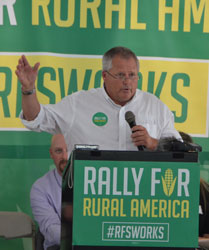Many fuel retailers were on hand at the EPA public hearing last week on volume obligations under the Renewable Fuel Standard (RFS) to tell their stories about selling higher ethanol blends.
 Among those who testified at the hearing and also spoke at the #RFSWorks rally was Cheryl Near, who owns Jump Start gas station in Wichita, Kansas with her husband Phil. The couple is featured in the movie PUMP, a documentary about America’s addiction to oil and the monopoly of the oil companies that works to prevent consumer choice at the pump.
Among those who testified at the hearing and also spoke at the #RFSWorks rally was Cheryl Near, who owns Jump Start gas station in Wichita, Kansas with her husband Phil. The couple is featured in the movie PUMP, a documentary about America’s addiction to oil and the monopoly of the oil companies that works to prevent consumer choice at the pump.
“We need to be supporting homegrown renewables, we need be blending more ethanol into our fuel supply, not less,” said Near at the rally, who added that oil companies are controlling the price of higher ethanol blends. “We need blender pumps, we need to buy direct from the ethanol plants, and then we can pass our savings on to the consumers.”
Listen to Near’s rally comments here: Fuel retailer Cheryl Near at RFS Rally
Other retailers who testified at the hearing included Scott Zaremba, owner of Zarco USA, and Charlie Good, owner of Good and Quick convenience store in Nevada, Iowa. “We have seen our ethanol sales numbers increase as we educate the public on the higher ethanol blends,” said Zaremba, who was the first retailer to offer E15 in the United States. “Renewable blends make up 98% of my gasoline sales mix, and almost 30% of the fuel I sell is in renewable blends above ten percent,” added Good.
Dave Sovereign, owner and operator of the Cresco Fast Stop, summarized the thoughts of many retailers, telling EPA, “When consumers have a choice, there is no blend wall.”
Other stories of higher blend fuel retailers can be found on the American Coalition for Ethanol website Flexfuelforward.com.











